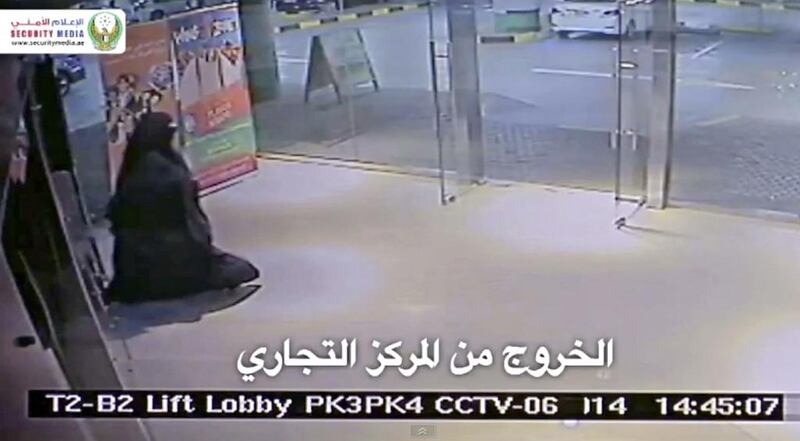DUBAI // Judges and police say the use of religious clothing as a disguise while carrying out a crime is tarnishing the image of Islam and abuse of the veil will lead to additional punishment.
The comments came after an 11-year-old was sexually assaulted and killed by a man wearing an abaya and niqab in Abu Dhabi this month.
The murder was one of a series of incidents where a veil was used by a criminal to disguise their identity.
In 2015, police arrested a woman who concealed her face with a niqab while trying to hold up an Abu Dhabi currency exchange with a replica gun and a knife.
The year before, Alaa Al Hashemi, dressed in a niqab, murdered Ibolya Ryan, an American schoolteacher, in a restroom in Boutik Mall.
Judge Ahmad Saif, head of Dubai Civil Court, said he was angered that criminals were using a religious symbol to aid in crime and suggested the niqab be banned from public places for security and identity verification purposes.
He said residential buildings, banks, courts, businesses and schools were some of the areas where visual identification was necessary.
“For instance, in court a woman wearing a full face veil is asked to remove it to make sure that the actual person is the one dealing with the judge and not someone else,” Judge Saif said.
“There are specific situations where it is essential for people to be identified and seen for security reasons and to ensure the safety of our community.”
The abuse of the veil has tarnished the image of Islam, the judge said.
According to lawyer Yousef Al Bahar, a man disguising himself in a niqab and abaya is committing a criminal offence.
This could incur a sentence of up to a year in prison and a Dh10,000 fine in addition to the punishment for the crime committed.
“Identifying people and carrying check-ups in residential areas and schools is a must to prevent crimes and ensure community safety,” Mr Al Bahar said.
The director general of Dubai Judicial Institute, Judge Jamal Al Sumaiti, said even if people disagreed on banning the niqab in public places, identifying an individual when they entered a building was a priority.
“Identities must be checked when entering a building or any other entity, similar to the procedures taken in airports,” Judge Al Sumaiti said.
Maj Gen Khalil Al Mansouri, assistant to Dubai Police’s Chief for Criminal Investigation, said police officers are always able to identify those who commit crimes even when they conceal their faces.
“Police patrols carry check-ups and monitor public and residential places. If anyone is found violating the law, he or she will be detained.”
Police are constantly on the look-out for men who might be wearing a veil to commit crimes and are identifiable by their gait, he said.
While restrictions on wearing a niqab in public may improve security, Judge Al Sumaiti said cultural sensitivities may make enforcement difficult.
“Wearing a niqab and abaya is passed on from grandmothers to mothers,” he said.
Judge Saif agreed, saying women may feel embarrassed when asked to remove their face veil for identification. He said the niqab was not mandatory in Islam, but “our religion, Islam, and Islamic beliefs stand out to protect people.”
nalramahi@thenational.ae






